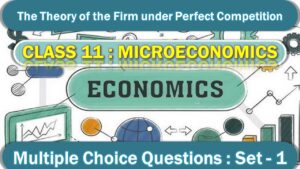CBSE Class 12 Ray Optics and Optical Instruments Multiple Choice Questions with Answers. MCQ Questions Class 12 Ray Optics and Optical Instruments with Answers Is Prepared Based on Latest Exam Pattern. Students can solve NCERT Class 12 Ray Optics and Optical Instruments MCQs with Answers to know their preparation level.
Students who are searching for NCERT MCQ Questions for Class 12 Ray Optics and Optical Instruments with Answers are compiled here to get good practice on all fundamentals. Know your preparation level on MCQ Questions for Class 12 Ray Optics and Optical Instruments with Answers. You can also verify your answers from our provided MCQ Class 12 Ray Optics and Optical Instruments with Answers. So, ace up your preparation with MCQ of Class 12 Physics Examinations.
MCQ Questions Class 12 Ray Optics and Optical Instruments with Answers - Set - 5
Question 1:
For achromatic combination of lenses, if we use two lenses of focal length f’ and f1 dipersive power to ω and ω’ respectively, then
(a) ω = ω0, ω’= 2ω0, f’ = 2f
(b) ω = ω0, ω’ = 2ω0, f’ = -2f
(c) ω = ω0, ω’ = 2ω0, f’ = f/2
(d) ω = ω0, ω’ = 2ω0, f’ = -f/2
Correct Answer – (D)
Question 2 :
A certain far-sighted person cannot see objects closer to the eye than 100 cm. The power of the lens which will enable him to read at a distance of 25 cm will be?
(a) 3D
(b) 1D
(c) 4D
(d) 2D
Correct Answer – (A)
Question 3 :
The velocity of light in vacuum is 3 × 1010 cms-1. The velocity of light in a medium (µ = 1.5) is:
(a) 2 × 1010cms-1
(b) 4.5 × 1010cms-1
(c) 1.5 × 1010cms-1
(d) None of these
Correct Answer – (A)
Question 4 :
When a beam of light is used to determine the position of an object, the maximum accuracy is achieved if the light is :
(a) polarized
(b) of longer λ
(c) of shorter λ
(d) of high intensity
Correct Answer – (C)
Question 5 :
The RI. of the material of a prism is √2 and its refracting angle is 30°. One of the refracting surface of the prism is made a mirror. A beam of monochromatic light entering the prism from the other face retraces its path, after reflection from mirror surface. The angle of incidence on prism is:
(a) 0°
(b) 30°
(c) 45°
(d) 60°
Correct Answer – (C)
MCQ Questions Class 12 Ray Optics and Optical Instruments with Answers
Question 6 :
Which produces additional luminiscence in a fluorescent tube?
(a) infra red rays
(b) ultraviolet rays
(c) micro waves
(d) radio waves
Correct Answer – (B)
Question 7 :
Which of the following is not essential for the formation of a pure spectrum?
(a) parallel beam of light
(b) narrow beam of light
(c) screen
(d) prism in the minimum deviation position
Correct Answer – (C)
Question 8 :
A convex lens is dipped in a liquid, whose R.I. is equal to that of R.I. of material of the lens. Then its focal length will:
(a) become zero
(b) become infinite
(c) reduce
(d) increase
Correct Answer – (B)
Question 9 :
A telescope has an objective lens of 10 cm diameter and is situated at a distance of 1 km from two objects. The minimum distance between these two objects, which can be resolved by the telescope, when seen in the light of mean λ = 5000 A is of the order of:
(a) 5 mm
(b) 5 cm
(c) 0.5 m
(d) 5 m
Correct Answer – (A)
Question 10 :
A point object is placed at the centre of a glass sphere of radius 6 cm 3 and RI = 3/2 The distance of virtual image from the surface of the sphere is :
(a) 2 cm
(b) 4 cm
(c) 6 cm
(d) 12 cm
Correct Answer – (B)
- NCERT Solutions Class 11 Chemistry Chapter 1 : Some Basic Concepts of Chemistry
- NCERT Solutions Class 11 Chemistry Chapter 2 : Structure Of The Atom
- NCERT Solutions Class 11 Chemistry Chapter 3 : Classification of Elements and Periodicity in Properties
- NCERT Solutions Class 11 Chemistry Chapter 4 : Chemical Bonding and Molecular Structure
- NCERT Solutions Class 11 Chemistry Chapter 5 : States of Matter
- NCERT Solutions Class 11 Chemistry Chapter 6 : Thermodynamics
- NCERT Solutions Class 11 Chemistry Chapter 7 : Equilibrium
- NCERT Solutions Class 11 Chemistry Chapter 8 : Redox Reactions
- NCERT Solutions Class 11 Chemistry Chapter 9 : Hydrogen
- NCERT Solutions Class 11 Chemistry Chapter 10 : The s-Block Elements
- NCERT Solutions Class 11 Chemistry Chapter 11 : The p-Block Elements
- NCERT Solutions Class 11 Chemistry Chapter 12 : Organic Chemistry: Some Basic Principles and Techniques
- NCERT Solutions Class 11 Chemistry Chapter 13 : Hydrocarbons
- NCERT Solutions Class 11 Chemistry Chapter 14 : Environmental Chemistry




